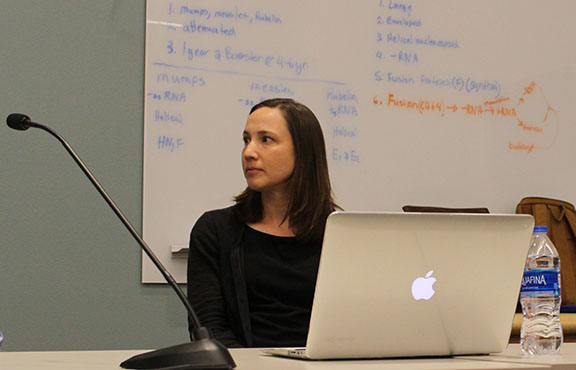For cancer patients living in the El Paso-Ciudad Juarez metroplex, treatment is not just expensive, costing thousands of dollars for the uninsured, but also difficult to find. Although El Paso has two oncology centers and a few independent oncologists, according to the non profit cancer support group Junt@s Vamos, services such as Pet scans, radiation treatment and chemotherapy are not easily available in neighboring Ciudad Juarez, a border city of almost 1.5 million residents.

Anthropology professor and Junt@s Vamos core collaborator in Las Cruces Mary Alice Scott takes questions from students at an opioids conference at New Mexico State University on Sept. 27, 2018.
Launched in 2013 by Juarez resident Cristina Coronado, Junt@s Vamos aims to provide a safe space for people with cancer to talk about their illness and receive emotional support. The group also aims to inform patients of their rights and treatments they can seek elsewhere.
There are four core members of the group, but the community involvement extends beyond them. Every fundraiser event consistently draws about 15 volunteers. Aside from the core members, Junt@s Vamos also has eight permanent volunteers.
The health information sessions they hold in Ciudad Juarez throughout the year usually draw 200 people suffering from cancer. The sessions cover health screenings and nutrition plans that can help patients recover quickly from medical treatment. The group also provides alternative therapies for women who have cancer in the form of massage and physical therapy.
Junt@s Vamos’ next step is developing a small business network, group members said. They have started working with women cancer survivors to develop their artisan skills so that they can have a source of income.
“We are working on developing a small business model so women can work to generate their own income. We have been engaged to get them to work artistry work to generate income,” Mary Alice Scott, a coordinator for Junt@s Vamos in Las Cruces.
Years before Coronado’s own cancer experience, the idea for Junt@os Vamos arose when she and another woman named Cynthia met at Juarez clinic where they were both volunteers. Cynthia had struggled with cervical cancer for several years. Due to her dire economic situation, she had not been able to access appropriate and timely treatment for her disease in her hometown of Juarez. Her desperate situation inspired Coronado to gather an informal group of friends in support of Cynthia, who died 20 days after the group’s first meeting.
After Cynthia’s death, the volunteers decided to form a group to help other cancer patients in similar situations. Over the last five years, the group of women and men have dedicated their time to help cancer sufferers from Juarez travel to Chihuahua city, Mexico and Mexico City for treatment not readily available in the three-state El Paso-Juarez-Las Cruces border region.
Scott, who works with the group closely, is also the graduate director of the NMSU Department of Anthropology and has helped organize fundraisers in Las Cruces to support cancer patients from Juarez.
“I have wanted to make sure that I am supporting my new community in any way that I can. I consider this whole border region part of my community, so Junt@s Vamos fits very well into that,” Scott said.
She said her family’s own history of receiving cancer treatment in the United States compared with the lack of access for uninsured El Pasoans and residents of Juarez influenced her involvement with Junt@s Vamos.
“While not everyone in my family has survived cancer, each person has been able to receive appropriate cancer treatments and has had access to clinical trials of new cancer drugs here in the United States,” Scott said. “In my first conversation with Cristina, I was just really struck by the injustice of that difference and wanted to support Junt@s Vamos in their work to address that injustice.”
During her time working with Junt@s Vamos, Scott has seen the group evolve in its outreach to cancer patients and now also provides support for survivors.
“The project changes according to needs and issues that arise for members of the group. There has been an increasing emphasis on health fairs and other outreach to communities in and around Juarez that go beyond just a focus on cancer to consider health more broadly,” she said.
The group is also completing construction of a recovery house where people who (return) to Juarez following cancer treatment can have “a quiet, peaceful place to stay as they recover from their treatment and their travel,” she added.
The binational nature of the border has presented a challenge, Scott said, because some Juarez volunteers and patients don’t have permission to cross into the U.S. for meetings and fundraisers.
Scott also sees her relationship with the other group volunteers and patients as reciprocal. While she has worked to help cancer patients obtain treatment and have a safe space in which to express themselves, they have also taught her life lessons.
“One of the things I have learned about health justice work is to change the language around survivorship,” Scott said. “Sometimes talking about people as survivors really narrows the view and understanding of a person’s whole life. Cancer is just one part of life. So the group’s focus on living rather than surviving has been an important lesson for me.”
